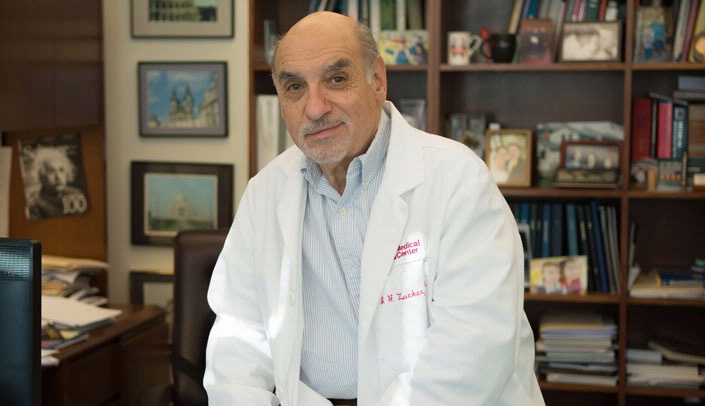UNMC is part of a seven-university consortium working on a three-year, $8.6 million grant from the National Institutes of Health to map the heart’s nervous system. The group’s goal — to conduct research that leads to new ways to treat cardiovascular disease by targeting nerves in the heart.
The UNMC team
Dr. Zucker’s research team (Kaushik Patel, Ph.D. and Harold Schultz, Ph.D.) has a program project grant studying chronic heart failure that has brought in more than $32 million in continuous funding from the National Institutes of Health since its inception in 1999.
In the grant being headed by UCLA, Dr. Zucker’s team, which includes Dr. Schultz and Hanjun Wang, M.D., department of anesthesiology, is studying a subset of nerves in the heart that signal cell pain during a reduction of blood flow, which occurs with a heart attack.
“When people experience a heart attack, they have a deep sense of chest pain,” Dr. Zucker said. “It’s a crushing, burning sensation, as various nerve receptors are being activated.”
Dr. Zucker’s group will try to manipulate these nerve endings by using the drug resiniferatoxin (RTX for short). These nerves produce a protein called TRPV1, and RTX binds to the TRPV1 protein.
“We’re not trying to take away the pain,” Dr. Zucker said. “We are trying to take away the consequences by eliminating the nerve receptors. Ultimately, we want to define the importance of sensory nerve endings in the heart and their relationship to worsening heart failure and hypertension.”
Irving Zucker, Ph.D., professor and chair of the UNMC Department of Cellular and Integrative Physiology, is the principal investigator for the UNMC component.
Kalyanam Shivkumar, M.D., Ph.D., director of the UCLA Cardiac Arrhythmia Center and Electrophysiology Programs, is the lead investigator on the project.
“Understanding the nervous system’s control of the heart is such a complex problem that it requires a collaborative approach, and we’re pleased that so many experts are coming together for this initiative,” Dr. Shivkumar said. “Our goal is to precisely map the heart’s anatomy and code the function of the nerves that control the heart from a very basic level all the way to clinical studies in humans.”
More than 800,000 people in the U.S. die each year from cardiovascular diseases such as heart failure, arrhythmia and hypertension. These problems often are linked to the autonomic nervous system, the part of the nervous system that signals the heart to beat and controls breathing, digestion and other body processes that typically happen without conscious effort.
Researchers believe that modulating those electrical signals holds promise as a way to treat heart failure and other common cardiovascular problems.
“This is recognition of the contributions we’ve made in this field over the years,” Dr. Zucker said. “We are honored to be working with some of the top universities in the world, such as UCLA, Caltech, Harvard and Oxford.”
The information the consortium produces could point the way to new therapies that target neural structures, and it could suggest ways for scientists to create more effective electrical stimulation therapies based on the methods being used today, Dr. Shivkumar said.
“Understanding how the nervous system controls the heart offers researchers a tremendous opportunity to open up new paths to treat cardiac disease,” said Dr. Kelsey Martin, dean of the David Geffen School of Medicine at UCLA.
The award is from an NIH program called Stimulating Peripheral Activity to Relieve Conditions, or SPARC, which supports research on how the electrical signals of the peripheral nerves that connect the brain and spinal cord to the rest of the body control internal organ function.

Interesting. Given the fact that women often do NOT experience "classic" chest pain, I hope that the researchers will include an examination of gender differences as they move forward with their work.